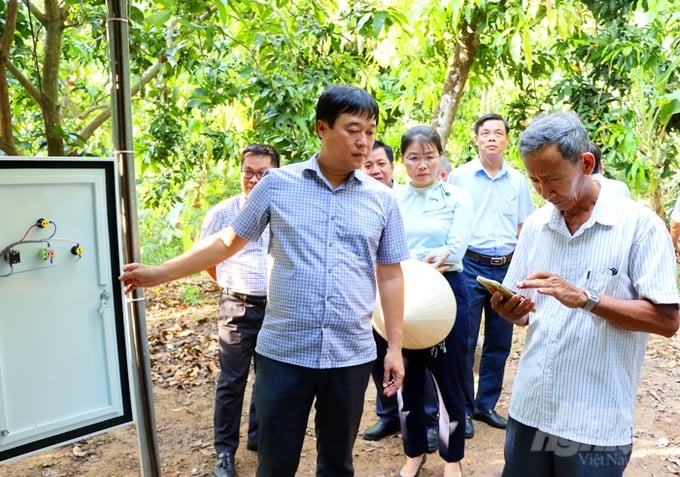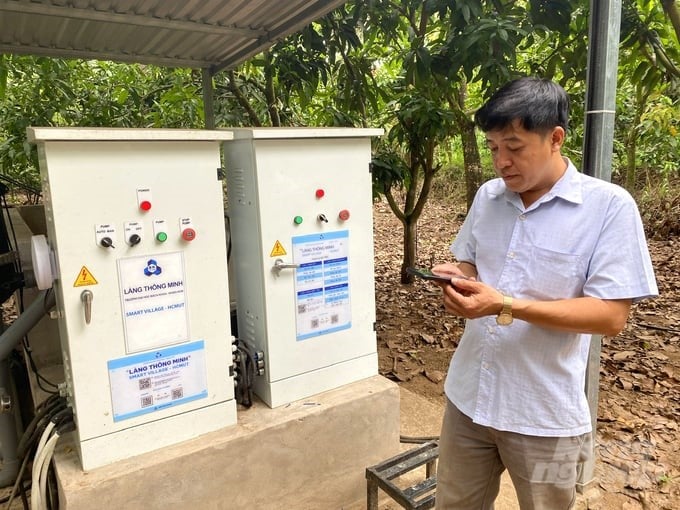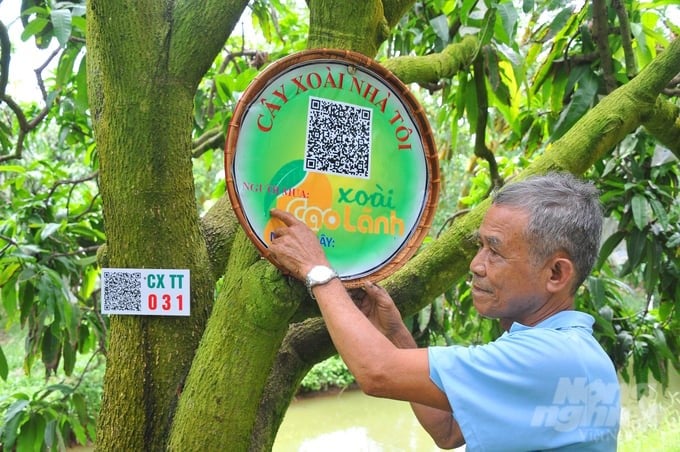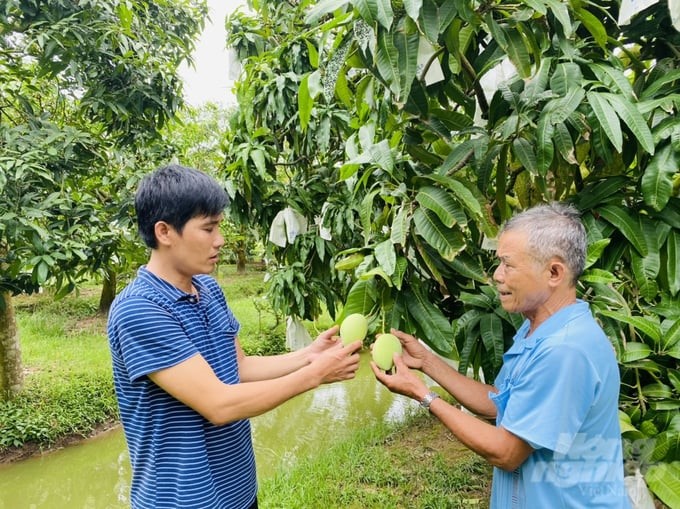November 21, 2025 | 01:16 GMT +7
November 21, 2025 | 01:16 GMT +7
Hotline: 0913.378.918
November 21, 2025 | 01:16 GMT +7
Hotline: 0913.378.918

Secretary of Dong Thap Provincial Party Committee Le Quoc Phong (left) investigates the implementation of smart villages and learns about people's manipulation of technology software applications at Tam Que Club (Tan Thuan Tay commune, Cao Lanh city). Photo: Le Hoang Vu.
The trend of digital transformation in agriculture and rural areas is happening more and more strongly in many countries around the world, and Vietnam is no exception to that trend. Building smart villages towards the goal of smart rural areas is identified as one of the important components of agricultural and rural digital transformation in Dong Thap.
A smart village is understood as a community model of hamlets, villages, and communes in rural areas that uses digital technology platforms to take advantage of local strengths and opportunities for sustainable development. Accordingly, in the smart village model, people will have a space worth living in, be connected, and enjoy better utilities and social services to improve their quality of life. This model also creates motivation for other fields such as eco-tourism, health tourism, medical tourism, experiential tourism, research tourism, etc. to develop together.
According to the Dong Thap Provincial People's Committee, the province will build smart villages from the foundation of farmers' clubs, in line with the trend of developing the digital economy, circular economy, and green economy. Currently, the first smart village construction model in Tan Thuan Tay commune (Cao Lanh city) has been co-chaired by the Dong Thap Provincial People's Committee and the University of Technology (under Vietnam National University, Ho Chi Minh City) and approved by the Ministry of Science and Technology with a total budget of approximately VND 16 billion.
The goal of this smart village model is to connect the community, apply science and technology, and innovate for sustainable rural development, aiming to improve people's quality of life based on local strengths and opportunities. According to the plan, Dong Thap province will build 7 smart villages by 2025 and increase to 14 smart villages by 2030. This is considered a new starting point, a new revolution in Dong Thap.

Building smart villages towards the goal of smart rural areas is identified as one of the important components of agricultural and rural digital transformation in Dong Thap. Photo: Le Hoang Vu.
Early in the morning, old farmer Dang Van Nhung (Bay Nhung, 75 years old), Head of Tam Que Club in Tan Thuan Tay commune (Cao Lanh city, Dong Thap), brewed a pot of tea and sat down to discuss agricultural production with neighbors. With a smartphone, Mr. Bay Nhung only needs to access a few operations of the monitoring system to display indicators of the water environment, soil moisture, salinity, pH, air, and hydrometeorology of the day in Tan Thuan Tay commune with full information. Based on those indicators, farmers can proactively produce.
Tan Thuan Tay commune is a perennial area specializing in mango cultivation with an area of nearly 500 hectares. However, traditional, small-scale production practices, a lack of linkages with businesses, etc. are still persistent limitations.
In 2017, Tam Que was the first club established in Tan Thuan Tay commune to share "village stories, neighborhood stories" and support each other in production and business because the club is an open space and a voluntary, multi-functional, multi-component mechanism. This is also a place for people with the same wishes and production professions to help each other develop.

Mango growers in Tam Que Club only need to perform a few operations on their smartphones to access the monitoring system and know the indicators of water environment, soil moisture, salinity, pH, air, hydrometeorology, etc. Photo: Le Hoang Vu.
Mr. Le Hoang Tung, Director of Tan Thuan Tay Mango Cooperative, said: Currently, people in Tan Thuan Tay commune mostly grow the famous Cat Chu mango variety; each tree is attached with a QR code for traceability. In addition to an area of nearly 500 hectares of mangoes with unique models, people also know about crop-spread farming, VietGAP mango, organic mango, etc. to both adapt to the market and link production and enhance value. People also do community-based tourism to promote the value of indigenous resources and apply advanced science and technology to production as well as in daily life.
"All of these achievements are thanks to the farmers' club model, a unique characteristic of Dong Thap province, where people sit together and share everything. Thanks to the club model, the smart village construction project has been chosen by ministries, branches, and Dong Thap province for pilot construction in Tan Thuan Tay, expected to be completed by mid-2024," said Mr. Le Hoang Tung, Director of Tan Thuan Tay Mango Cooperative.
Recently, Secretary of Dong Thap Provincial Party Committee, Mr. Le Quoc Phong, had a survey trip to Tan Thuan Tay commune and Thuan Tan and Tam Que Clubs in Cao Lanh City.
Through the survey, Secretary of Provincial Party Committee Le Quoc Phong grasped information about the progress, difficulties in implementation, as well as the organization and operation of the smart village system at the grassroots level and the orientation to replicate the model in the coming time from the leaders of Cao Lanh City.

Mr. Le Hoang Tung, Director of Tan Thuan Tay Mango Cooperative in Cao Lanh city, said: Currently, most people in the commune attach QR codes to trace the origin of each mango tree. Photo: Le Hoang Vu.
Secretary of Provincial Party Committee Le Quoc Phong wishes that building smart villages must let people feel practical benefits, voluntarily participate, and support the management, exploitation, and use of data. Therefore, it is essential to complete handbooks and guidance documents to train people and units that receive and operate software and have a department to handle arising errors.
As for Tan Thuan Tay commune, it is necessary to clearly and specifically assign responsibilities to professional groups. Develop a process for handling information and situations sent by people, especially information from the monitoring system, to provide early warnings to people.
The smart village information portal needs to reflect more boldly and vividly the life, culture, and production of people in Tan Thuan Tay. At the same time, it is recommended that the local government promote the role of young forces and clubs in operating and managing the smart village information system.

In 2024, Dong Thap will have 7 localities with smart villages. Photo: Le Hoang Vu.
It is expected that by the end of April 2024, the host unit will organize the acceptance of the facility and evaluate and inspect the products transferred to the locality, including the central data storage and analysis system for the smart village; electronic information portal for the club; model of environmental monitoring system; model of automatic irrigatio system; model of surveillance security camera system; model of smart public lighting system; model of smart electricity and water monitoring system; electronic farming handbook system, etc.
Mr. Huynh Minh Tuan, Vice Chairman of Dong Thap Provincial People's Committee, said: In 2024, Dong Thap will have 7 localities with smart villages assessed to meet standards, including My Dong and Doc Binh Kieu communes (Thap Muoi district); Tan Thuan Tay commune (Cao Lanh city); Dinh Yen commune (Lap Vo district); Binh Thanh and My Xuong communes (Cao Lanh district); and Tan Nhuan Dong commune (Chau Thanh district).
In 2025, there will be two more localities with smart villages assessed to meet the requirements, including Phu Cuong commune (Tam Nong district) and An Nhon commune (Chau Thanh district). The smart village model must fully meet contents and achievement targets according to the criteria of the Smart Village Criteria Set issued by the Dong Thap Provincial People's Committee.
Translated by Thu Huyen

(VAN) This is the study conducted by IRRI and Can Tho University on the rice straw value chain in Mekong Delta showing an economic potential of more than 6.6 trillion VND/year.

(VAN) By participating in cooperative economics, many farmers in Tay Ninh have overcome hardship, mastered clean dragon fruit cultivation techniques.

(VAN) The crossbreeding program in the former Binh Dinh province (now part of Gia Lai) has shown signs of decline, and urgent measures are needed to revive it and sustain past achievements.

(VAN) The agricultural sector agreed on a roadmap to pilot the MRV protocol and expand low-emission rice production from the 2025-2026 winter-spring crop.

(VAN) Agricultural extension officers in Quang Ninh do more than transmit knowledge; they have become a steadfast support system for farmers on the path to sustainable agricultural development.

(VAN) The development of a high-quality beef cattle herd has brought major benefits to livestock farmers, creating jobs and enabling better use of agricultural by-products.

(VAN) In the eastern region of Gia Lai, crossbred cattle now account for 93%, forming a high-quality beef herd and establishing a recognized brand, the result of 35 years of persistent effort.